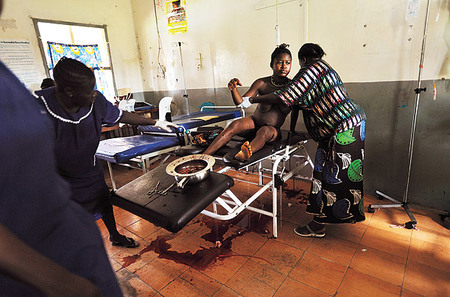A Ravaged Healthcare System

Photo by: Lynsey Addario/ Times Magazine
Sierra Leone was left devastated after an almost 11 year civil war ended in 2002. Several years later, the citizens of Sierra Leone still find themselves paying the price for the war’s damages. With the country showing traces of reformation, there are still several issues that need to be addressed with urgency. A few of these issues include: the country’s poor infrastructure, widespread corruption, systemic inadequacies, and most importantly a ravaged healthcare system.
For reasons such as inadequate medical practices & supplies, improper abortion procedures, discrimination against the women, financial strains, and geographical barriers, Sierra Leone has one of the highest infant and maternal death rates in the world. The women of Sierra Leone live within the constrictions of a medical dilemma, where 1,165 mothers die per 100,000 live births and 1 out of 17 mothers have a lifetime risk of death associated with childbirth. According to Amnesty International, less than 45% of births are supervised by professional workers. Furthermore, several districts in the nation do not have emergency obstetric care. This deprives the women of c-sections, blood transfusions, and other life-saving procedures. The hospitals also lack the standard medical supplies and medicines necessary to sustain a woman and child in need of natal care.
Hospitals in the region regularly see cases of maternal death that are preventable, yet they still result in tragedy because of delays in receiving proper treatment. This is often due to the fear of cost and the lack of recognition of life-threatening situations. Delays in receiving treatment are also attributed to poor infrastructure and a lack of emergency personnel. Much of the nation’s roads are in poor condition and there is an unequal distribution of hospitals throughout the country, leaving some to travel long distances at high costs. Upon arrival to the hospitals there are few trained staff, insufficient medical supplies, a lack of clean water, and frequent power outages. The health care providers often ask for payment or small incentives due to the fact that nurses go unpaid and volunteer their services. To avoid situations such as these, patients in need of care often seek aid outside of the hospital by untrained individuals.
In order for the women of Sierra Leone to receive the proper and reliable health care that their humanity entitles them, it is essential that we increase the education of and advocacy for these women. Looking into the future there is hope. Through the realization of the vision set forth by the New Hope Movement campaign, the women of Sierra Leone can gain trust in their system and their country, giving them a sense of empowerment. Through the joining of forces we can make this vision a reality.
For reasons such as inadequate medical practices & supplies, improper abortion procedures, discrimination against the women, financial strains, and geographical barriers, Sierra Leone has one of the highest infant and maternal death rates in the world. The women of Sierra Leone live within the constrictions of a medical dilemma, where 1,165 mothers die per 100,000 live births and 1 out of 17 mothers have a lifetime risk of death associated with childbirth. According to Amnesty International, less than 45% of births are supervised by professional workers. Furthermore, several districts in the nation do not have emergency obstetric care. This deprives the women of c-sections, blood transfusions, and other life-saving procedures. The hospitals also lack the standard medical supplies and medicines necessary to sustain a woman and child in need of natal care.
Hospitals in the region regularly see cases of maternal death that are preventable, yet they still result in tragedy because of delays in receiving proper treatment. This is often due to the fear of cost and the lack of recognition of life-threatening situations. Delays in receiving treatment are also attributed to poor infrastructure and a lack of emergency personnel. Much of the nation’s roads are in poor condition and there is an unequal distribution of hospitals throughout the country, leaving some to travel long distances at high costs. Upon arrival to the hospitals there are few trained staff, insufficient medical supplies, a lack of clean water, and frequent power outages. The health care providers often ask for payment or small incentives due to the fact that nurses go unpaid and volunteer their services. To avoid situations such as these, patients in need of care often seek aid outside of the hospital by untrained individuals.
In order for the women of Sierra Leone to receive the proper and reliable health care that their humanity entitles them, it is essential that we increase the education of and advocacy for these women. Looking into the future there is hope. Through the realization of the vision set forth by the New Hope Movement campaign, the women of Sierra Leone can gain trust in their system and their country, giving them a sense of empowerment. Through the joining of forces we can make this vision a reality.
